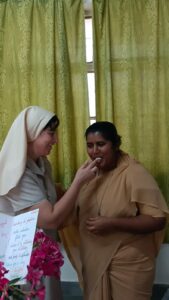
From the cliffs of an India never forgotten: my missionary experience
Sister Ines recounts the difficulties and the beauty of an experience of mercy
Towards the end of June 2023, full of hope and curiosity, I left for Rajasthan, a region located in the far north, on the close border with Pakistan.
Our community actually gathers sisters from different religious families, as this part of India, unlike the south, is one of the most hostile and the missionaries have great difficulty living and surviving there.

What is happening in India today that nobody talks about?
Just as we do not talk about Africa, about its abuses, we do not talk about India.
The so-called castes and the Hindu culture are not part of a distant past nor the preserve of oriental civilisation enthusiasts!
It is a reality revisited today according to the new forms that the times demand.
Politics
Hindu extremists, with the help of clear-cut politicians, have as their goal an exclusively Hindu India. The violence against Christians and other religious minorities is unequivocal. An unconstitutional anti-conversion law continues to create silent tensions, as in a cold war. Religious women have ended up in handcuffs because they wanted to convert: a Holy Mass celebrated with a little more emphasis, festive, engaging, not collected, is enough.
Nuns in villages near mine stripped and beaten. So, we are a few dozen perishing Christians here.
The culture
Forms of resistance in contact with education in opening up to stimuli from the rest of the world, hermetic closures, traditionalisms.
The social order

I once allowed myself to do something that was not my responsibility, as simple as picking up a baby. It was not me who had to do this but the women who were dedicated to it as in other daily practices, the women of service, les servants, of all wages. You see them sitting there on the floor, almost like an organising machine, they smile at you, they are not in the management or consulting rooms, and they are not the caretakers of yesteryear. Hired in the kitchen, always there, a ritual and custom that repeats itself. Low or no literacy except in the local language.
While you are on the road, a string of loose cows, left in the wild come towards you, you narrowly avoid them with your car. At night it is a great difficulty. In India, cows are sacred.
So, with all these political and social problems, one would not expect to see so many good feelings in young people: hope, openness, proximity, genuine brotherhood, mercy. And not infrequently in the nice people you meet.
Although it also remains in the DNA of India as well as Africa to be a colonised society.
And indigenous pride spills over in so many forms onto the stranger, always seen as the bearer of undoubted material benefits, charity seen differently, the generosity of those who should give money, help feed and build churches like an industrial tycoon.
We are and aspire in God to be builders of a resurgent humanity.

So, with all that, I am happy with my new experience.
I have climbed on a dromedary in the desert for the first time, I have seen so many peacocks running on the road all of a sudden (even a black cobra up close for that matter, on the attack) I am trying a new cuisine, I am getting into a mindset that is not my own, I am learning Hindi, the international language of India.
With my Roti and chabati of every morning that is the bread of here, I say hello (Namaste) and invite you to join me for this heart that beats in unison full of hope
